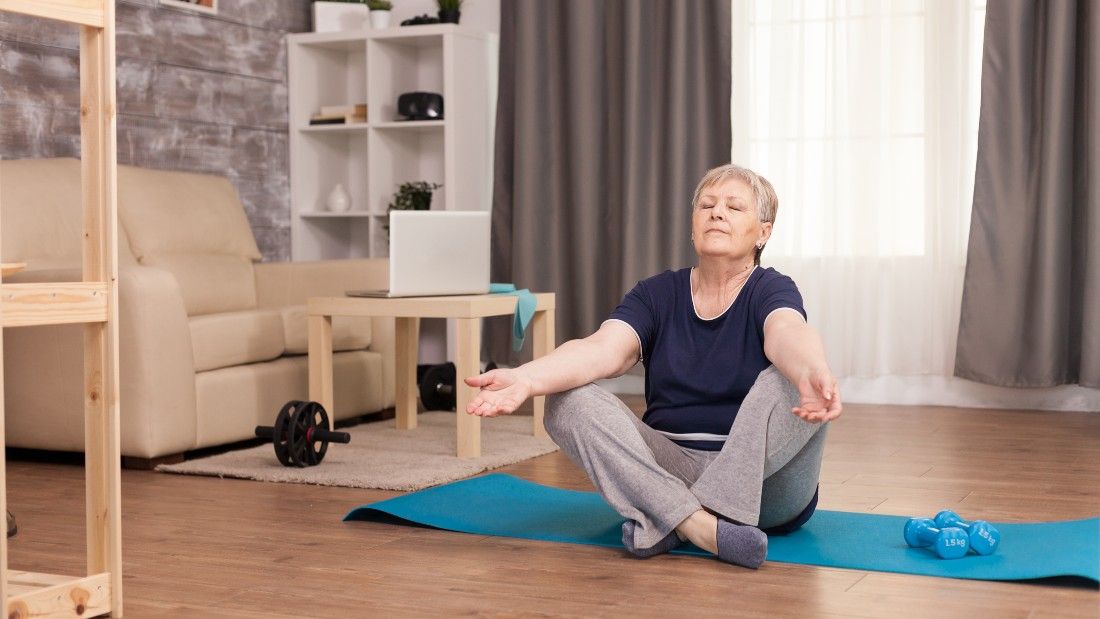6 tips for being a thriving vegan in older age

As we age life throws many obstacles our way. Some of them will be beyond our control and unpredictable. However, there are some things we do have control over and actions we can take to give ourselves the best chances of thriving in our older age. Here are six of the best.
1. Stay strong
Once we hit middle-age it becomes harder for our bodies to gain and maintain muscle and skeletal mass. This natural process is known as sarcopenia. It can result in frailty and an increased risk of injury from knocks and falls. Although it is a totally natural phenomenon, there are still things we can do to limit the process.
Firstly, we need to make sure we’re consuming enough protein. Up until the age of 65, in the developed world, we don’t need to worry about getting enough protein. In fact, most people who eat meat and dairy get too much, resulting in an increased risk of disease and death. But switch to plant-based protein sources and “these associations were either abolished or attenuated”, according to a 2014 study. The same study concluded that it may be important to “gradually adopt a moderate to high protein, preferably mostly plant-based consumption [in older age] to allow the maintenance of a healthy weight and protection from frailty.”
Reassuringly, a recent meta-analysis in Nutrients found that “protein source [meat versus plants] did not affect changes in absolute lean mass or muscle strength” while another study showed that a more alkaline diet based around fruits, beans and vegetables is more conducive to building muscle mass in the elderly. So, a plant-based diet is the perfect choice to stay strong into your seventies.
But just as important as what we put in our body is what we do with our body. Some studies found that the most important factor in maintaining a strong skeleton and good muscle mass is exercise – in particular resistance training. If you’re able, using resistance bands or doing some simple body weight exercises daily (such as this 5-minute kitchen workout) can keep you strong into old age. The term ‘use it or lose it’ has never been more apt.
2. Eat brain foods
Our mental capability is a concern for many of us as we age. Our brain health usually declines as a result of oxidative stress and chronic, low grade inflammation. Therefore, foods rich in antioxidants and with anti-inflammatory properties may help. And what are the best sources of these? Plants of course!
One phytonutrient has been proven to be particularly important in cognitive health, and that’s the carotenoid, lutein. A 2016 study found that lutein “promote[s] cognitive functioning in old age by enhancing neural efficiency.” In 2014, it was found that people suffering from Alzheimer’s disease had significantly less lutein in their eyes and blood. The best dietary sources are dark leafy green vegetables such as kale and spinach.
Flavonoids are another group of natural compounds found only in plants which may help our brain. They are found in their greatest concentration in fruits and vegetables of the brightest colours. Blueberries and strawberries are a particularly good source. Studies have shown that high berry intake lowers the risk of developing Parkinson’s disease and slows rates of cognitive decline in older adults.
And we mustn’t forget omega-3 fats found in flaxseed and walnuts, which we need to keep our brain healthy. Our body converts the essential fatty acid ALA (found in flaxseeds and walnuts) into the useful longer chain fatty acids EPA and DHA. As long as we consume enough omega-3, our bodies can turn it into EPA and DHA but supplements made from algae, naturally rich in EPA and DHA, are also available if you want to be extra sure you’re getting enough.
3. Increase your B12
All B vitamins help the body release energy from food. Vitamin B12 also helps maintain healthy nerve cells and helps in the production of DNA, the body’s genetic material. Vitamin B12 works closely with folic acid, to make red blood cells, to help iron work better in the body and to produce a compound involved in immune function and mood.
Supplementing our diet with vitamin B12 is vitally important for vegans of any age, but after the age of 50, it doesn’t matter what diet you follow, everyone needs to supplement. For those under the age of 65, we recommend 50 micrograms a day or 2,000 a week. But once we get to 65 that may not be enough and we may need to take 1,000 micrograms a day because it becomes harder for our bodies to absorb B12 efficiently.
4. Eat immune-supporting foods
As we head into 2022 protecting our health has never been more important. As we age, our immune system becomes weaker making us more susceptible to colds, flus and other infections. But the food that we eat has a huge part to play in strengthening our immune system so if we eat wisely we can give ourselves the best chance to avoid illness or recover quickly when sickness strikes.
Ginger and turmeric are two super spices that provide a fantastic bang for your buck when it comes to immunity. They are inexpensive and contain powerful antioxidants and antimicrobial properties that help fight infection. Ginger is most beneficial when eaten fresh and when using turmeric, add some black pepper to your dish – it increases your absorption of the wonder substance, curcumin, from turmeric.
Other immune-boosting foods include garlic, which stimulates and activates your white blood cells, and berries which contain phytochemicals that help to protect our bodies from infections and environmental damage. Seeds, such as pumpkin and sesame, contain high levels of zinc, which is a mineral needed for optimal immune function.
Read more here: https://dev.viva.org.uk/blog/foods-to-support-immune-system/

5. Manage stress
Our DNA contains protective sections at the end of each chromosome called telomeres. Every time our cells divide (replicate), our telomeres become a little shorter until eventually they are too short to function so our cells – and therefore us – begin to age and die.
Although the shortening of our telomeres is completely natural, certain lifestyle factors can either speed up or slow down this ageing process. Alongside smoking, obesity, lack of exercise and a poor diet, stress is a major contributor to the shortening of our telomeres. Studies have shown that the stressed mothers of children born with serious health conditions have shorter telomeres equivalent to ten years of ageing, and similar has been seen in the carers of people with Alzheimer’s.
So, if we’re able to manage our stress we are able to reduce the shortening of our telomeres and therefore slow down ageing. A 2013 randomised control trial showed that just 12 minutes of meditation a day was linked to “an increase in telomerase activity suggesting improvement in stress-induced cellular ageing.” So alongside other healthy lifestyle choices such as not smoking, exercising often and following a wholefood plant-based diet, a little meditation practice to manage stress could help us live longer and happier.
6. Practise good sleep hygiene
There’s a common misconception that we need less sleep as we age but the truth is, a good night’s sleep is extremely important no matter how old we are. Sleep is a pillar of good health and getting enough of it reduces the risk of many common diseases, keeps our brain and digestive system healthy and supports our immune system.
As we age, we tend to experience less deep sleep and more fragmented, restless sleep. Sleep scientists are still debating the causes but it could have something to do with changing levels of the sleep hormone melatonin, a fatiguing of our neural receptors which tell us when we’re tired, or an increased amount of napping during the day, as well as other age-related problems such as a weaker bladder. In the face of these obstacles, it’s even more important that we set up the best conditions for a good night’s sleep. So what can we do?
- Get some natural morning light – even if it’s not sunny. This helps to regulate our melatonin production and set our circadian rhythm to the right time of day
- Eat a breakfast rich in the amino acid tryptophan to boost melatonin. Foods include: soya, chickpeas, quinoa, buckwheat, oats, chocolate, dates, sunflower, sesame and pumpkin seeds, almonds and peanuts
- Stop eating three hours before bedtime so your stomach can properly digest the food and prepare for sleep
- Dim the lights and reduce exposure to bright artificial light in the evening such as device screens and fluorescent lighting
- Our body temperature drops during sleep so cool the bedroom down to 18-21°C to signal to your brain it’s time for bed
Read more here: https://dev.viva.org.uk/health/health-articles/10-tips-to-help-you-sleep/
It’s never too late – or too soon – to start thinking about getting the best out of our twilight years. Yes, ageing will have its difficulties but there is no reason to believe we can’t thrive as older vegans. Hopefully these tips will help you do so.



